The modern-day Olympic Games have always been a time of contradictory feelings for GCT’s writer Anna Cominos, so it’s back to the books as she explores historically what the Olympic Games symbolise and what they have come to mean today.
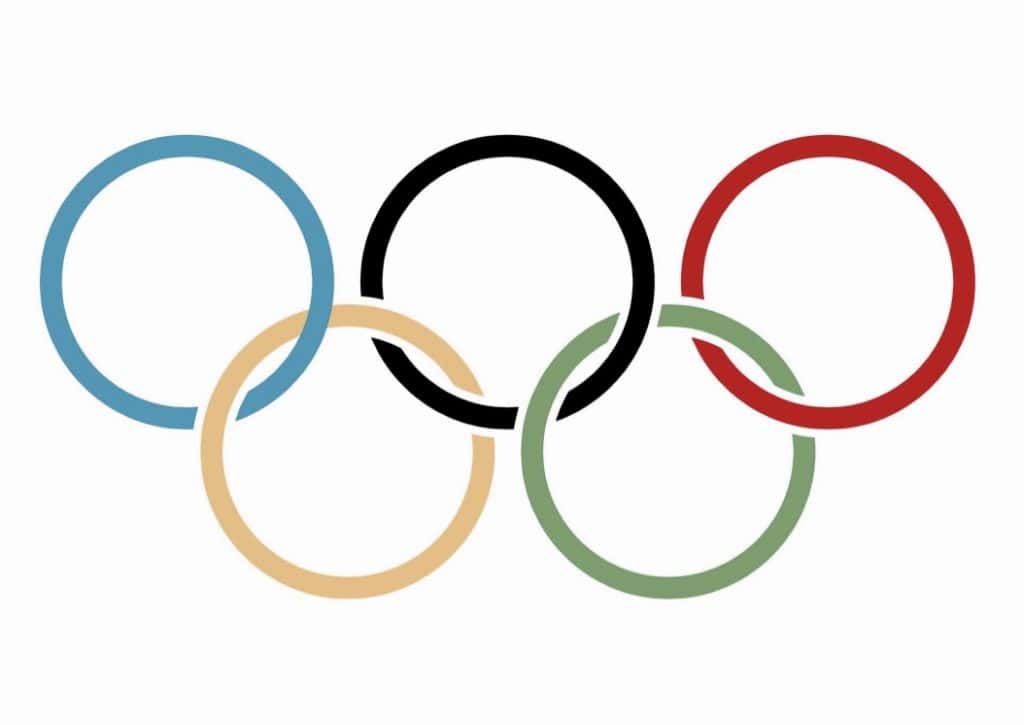
There is no denying that the modern Olympic Games are a corporate-sponsored blow-out, and their ‘truce-of-war’ spiritual and sporting-loving image makes them a high-ideal at this point in modern history. In fact, the Olympic Games have been the most constant global event mirroring ordinary life, along with marriages, christenings and funerals.
As the Paris 2024 games quickly come into focus, it’s time to explore the distant ancient historical beginnings and current modern-day histrionics.
← Flashback to the Ancient Olympic Games
We all know the Ancient Olympic Games were held in Greece every four years, but what were they really about? By many accounts, they were the peak of the annual Panhellenic Games calendar. Held all over the ancient Greek world, the Pythian Games, the Nemean Games, and the Isthmian Games were as many religious festivals as they were sporting competitions that celebrated the Gods of Mt Olympus.
In fact, some of these Games and ceremonies have been linked to the Elysian Mysteries and Delphic Prophecies. Young couples in the ancient world even planned their nuptials to avoid conflict with sporting events. But even in these times, the Olympic Games were the highlight of the Ancient Greek calendar, honouring the God-father of Mt Olympus, Zeus.
All the Panhellenic Games, including the Olympic Games, were considered to be very sacred events that called on the Gods of Mt Olympus to commune with humans. To really understand the Ancient Olympic Games and their sacral symbolism in the ancient world, it’s important to note that all challengers would participate naked. Modesty is modern-day making, so consider Ian Thorpe’s skin-like swimming suit and then minus it- absolutely naked.
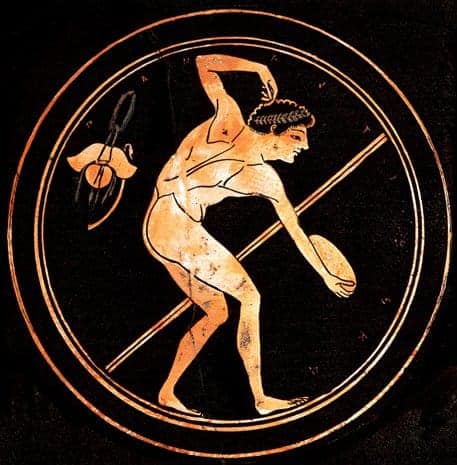
The Olympic Games events were athletic and religious and are still hotly contested to this day, like running races and the gruelling pentathlon. Equestrian events like chariot races have evolved into horse jumping and polo events, while the ancient Olympics and the Modern Olympics both include combat sports like wrestling.
The haunting site of the ancient Olympic Games still stands in Ancient Olympia, minus the incredible Zeus statue (regarded as one of the seven wonders of the ancient world, was 13-foot high and carved by celebrated sculptor Phidias, whose Statue of the Goddess Athena was the centrepiece) of the Acropolis.
Many of the participants were victorious soldiers, so a truce on war was declared to allow the safe passage of Olympic pilgrims and competitors alike. All winners were presented with an olive branch (symbol of peace) or a crown of bay-laurel leaves and, on their return to their city-states, were lauded with gifts- this can be likened to the modern-day sponsorship deals.
Perhaps the closest to this ancient Olympic spirit of ‘Glory’ seen in modern times is the victorious 2004 Greek Soccer Teams’ Euro-Cup return to Greece from Portugal. With the trophy in hand, the sporting team's buses came directly from the airport to the ancient Panathenaic Stadium/ Kallimarmaro stadium in the heart of Athens. Adoring crowd-lined streets, they waved their heroes on, and these sporting heroes were publicly ‘crowned with bay laurel leaves’.
Sadly, the ancient Olympic Games disappeared when the Roman Emperor Theodosius I stopped all pagan cults and ceremonies. The statue of Zeus displayed in Ancient Olympia is thought to have disappeared under Caligula’s rule of Rome.
Fast forward to the Modern Olympic Games →
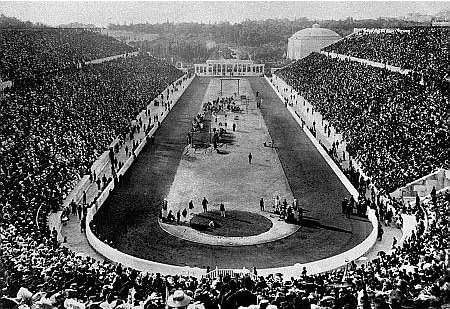
Unlike the ancient Olympic Games, no olive branch of peace is offered, no halting world events, and no regional disturbances. In fact, the ideals of the Modern Olympic Games are from a world long gone.
On April 6, 1896, the Olympic Games, a long-lost tradition of ancient Greece, were reborn in Athens- 1,500 years after being banned. At the opening of the Athens Games, King Georgios I of Greece and a crowd of 60,000 spectators welcomed athletes from 13 nations to the international competition, with 241 athletes participating. (Just good to note here, in London 2012, over ten thousand athletes from 205 countries took part.)
Frenchman Baron Pierre de Coubertin is considered the father of the Modern Olympic Games, and in 1894, he founded the International Olympic Committee (IOC) to help build a peaceful and better world by educating young people through sport. He focused on a growing European sports movement that had athletes competing in various cities in outstanding sporting events and basically started the re-imagining of the Olympic Games.
A committed optimist, educationalist de Courbetin wanted to bring the attention of school sports to the world. He did not keep his beliefs a secret either- he believed that all those who compete at the Olympics remain amateurs and that NO new stadiums be used. In fact, Baron de Courbetin worked hard at keeping the ‘dogs of greed’ far from the Olympic Games.
He would not have had time for brand managers, spin doctors, and the marketing teams of today, and the diplomatic but principled Baron de Courbetin had no room for fluff, and his deep commitment to the pure amateurism of competing athletes became the backbone of the modern Olympic Spirit.
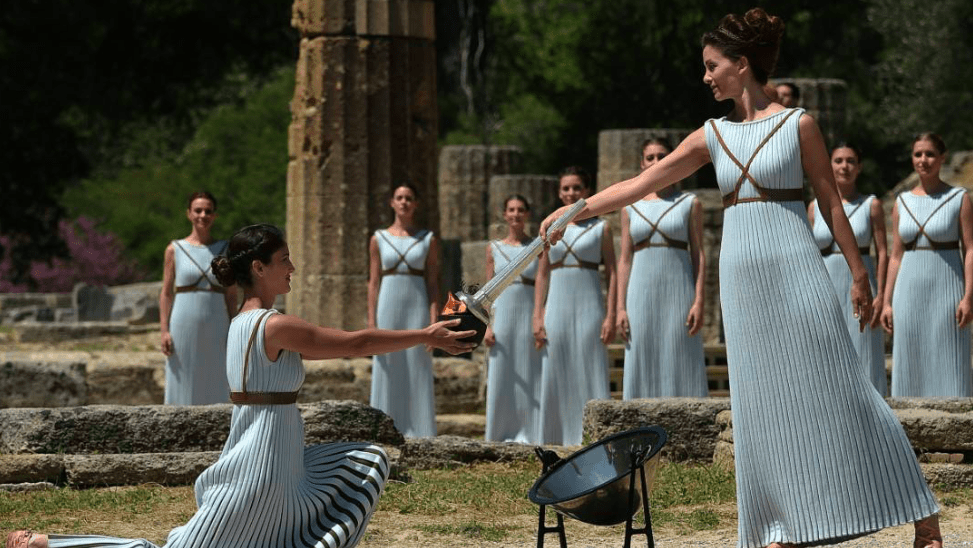
The Olympic flame has become a powerful symbol of the Modern Olympic Games. Commemorating the mythological theft of fire from the Greek god Zeus by Prometheus to give to the mortals. The flame is a homage to the Olympic Games’ ancient Greek beginnings- where a fire kept burning throughout the celebration of the ancient games. The fire was introduced at the 1928 Summer Olympics in Amsterdam and has been part of the modern event ever since.
In contrast to the Olympic flame, the torch relay of modern times, which had no ancient predecessor, transports the flame from Ancient Olympia, Greece, to the various designated sites all over the globe. It’s lit just as in ancient times, using a parabolic mirror reflecting the sun’s rays.
So how did the modern-day Olympic Games go from the high ideal of pure amateurism to the trademarked Olympic Rings?
The very close relationship between professional athleticism and the colour of money has, in the past 40 years, become very clear. The International Olympic Committee’s leadership seems to have been the deciding factor that sharply changed the nature of the event.
American Avery Burbage (1952 -72) took his role as President of the IOC very seriously and defended the Olympic Games against personal profit and commercial bend-ability, fiercely arguing for it to stand firm to its amateur code,
"We can only rely on the support of those who believe in the principles of fair play and sportsmanship embodied in the amateur code in our efforts to prevent the Games from being used by individuals, organisations or nations for ulterior motives," he said. His IOC presidency also marks the rise of television viewing, but not for the Olympics.
Then, in 1980, Juan Antonio Samaranch became the second longest-running President of the IOC (1980-2001) after de Courbetin. His IOC reign is remembered for introducing professional athletes to the Olympic Games and endless television and sponsorship deals. The end of his presidency included side-stepping corruption charges in the Salt Lake City Winter Games Scandal. The Sydney Olympics in 2000 were his last.
The Games have actually come to reflect the rough waters of global harmony like Jesse Owens being snubbed by Hitler at the 1936 Berlin Olympics, the iconic black power fists raised on the dais from the Mexico Olympics in 1968, and the sad outcome of political activism that saw 11 athletes murdered in Munich in 1972. Three Olympics have been cancelled due to World Wars, and two have been heavily boycotted during the Cold War, like Russia in 1984.
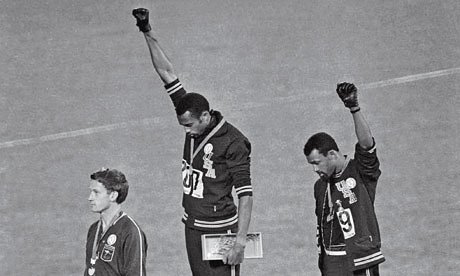
The new Olympic Games sprouted sporting tangents like the Winter Olympics, the Para Olympics and the lesser-known Youth Olympics.
The modern-day Olympic Games are symbolically powerful and known as the world’s first global event. But while hosting the event was once a sign of a nation’s invincibility and considered a symbol of the ultimate aspirational glory to showcase your modern nation, this is no longer the case, and there is so much to be said about the amount of money spent by nations’ holding the Olympics and the debt that comes with it afterwards.
Many social and sporting commentators are now calling for the Olympics to return to one location- just like in ancient times. That would mean the IOC no longer pressures every new host nation to ‘re-invent the wheel’ every four years.
Paris is well on track to host this year's Summer Olympics, as all the infrastructures will be ready in time for the extravaganza despite some minor hiccups.
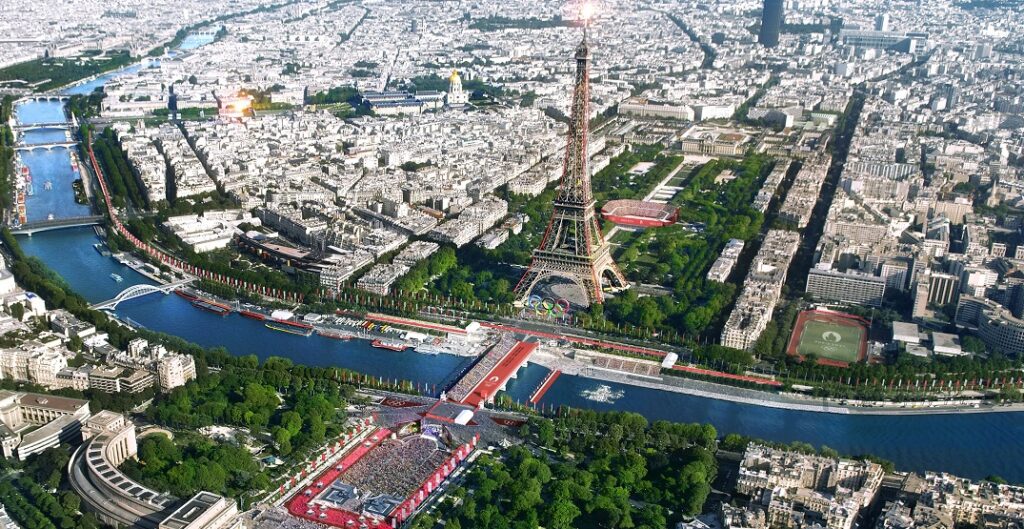
The Olympics will be held from July 26 to August 11, and the Paralympics will occur from August 28 to September 8.

